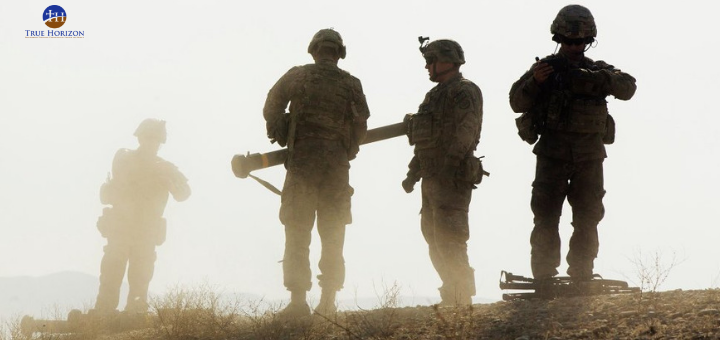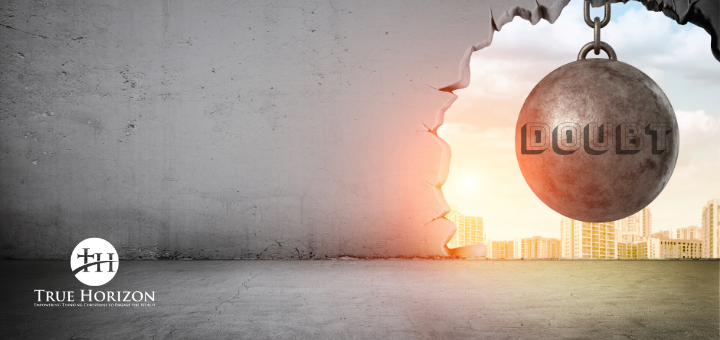Thoughts On Veteran’s Day: Where Love And War Meet
Our military exists to “provide for the common defense … and secure the blessings of liberty to ourselves and our posterity.” It’s a pretty straightforward mission. Unfortunately, that means military personnel must always be ready to fight wars. We all know this, but very few of us have to deal with its implications. This Veteran’s Day, I want to honor the veterans very close to me by offering a little insight into the reality of military service. No politics. No false humility. No veiled attempt to have someone “thank them for their service.”
I simply want to challenge others to think more about the whole idea of war. And I want them to see it from where it really matters — at the tip of the spear, the place where those who actually fight wars have to live.
Comfortably Numb
According to Pew Research, less than 1% of the U. S. population currently serves in the military. And only 7% of Americans are military veterans. That’s not a complaint. It’s an explanation.
About a year ago, a guy at church was asking about what my boys were doing. As I gave the rundown, I mentioned that one of them was in Iraq. He looked surprised. “What is he doing over there?” he asked.
When I told him he was deployed there with an Army Special Forces unit, his forehead wrinkled in response. “I thought the war was over?” he said.
No, the war is not over. But it is a reflection on the fecklessness of some in the media and government that it doesn’t make the headlines anymore. It is also a reflection of the character of our armed forces that, for the most part, they don’t care to talk about it either. That’s not why they serve.
Modern Warfare’s Invisible Consequences
To a greater degree than any time in human history, modern technology allows the vast majority of us to remain wholly disconnected from the horrors of war. In some cases, even those who are directly involved in combat are out of harm’s way. A drone pilot at a video console in Nevada can strike targets in the Middle East and then drive home for dinner.
But there is a moral element to this aspect of modern warfare. What happens when we detach the horror and pain of war from our ability to deliver it? Has this made war even more barbaric than it already was? Will our future leaders find it easier to commit our grandchildren to war because they have never personally experienced its consequences?
The answers to these questions are important because war will never be a detached reality for some.
Boots On The Ground
We need to think about these things. But we also need to realize that the basic reality of war that has never changed in the least. No land is conquered, no enemy is defeated, no aspect of warfare is complete unless, and until, there are boots on the ground.
And there are young men in those boots.
I am as guilty as anyone of taking this for granted. I have no delusions that I speak from some kind of moral high ground. The truth is that my own acknowledgment of this has come in an emotionally painful way — as I watch my own sons lace those boots up and walk away to fight.
Taken For Granted
The fact is that we do take their sacrifices for granted. We whine about our first-world circumstances while they walk with 80 pounds of combat gear on their backs; while they sleep, without protection from the elements, in the dirt and mud; while they wonder if the next step they take will be the one that triggers some diabolically disguised roadside bomb.
We bow to a consumerist culture and load our holiday shopping carts with things we don’t need, while they want for a bar of soap and some toothpaste. How many people walking around this week do you think ever give these realities a second thought?
The Silent Sacrifice
There is another side to this coin. When we recognize the sacrifices of those wearing the boots, we rarely think of the ones they leave behind. Even when they’re not technically “deployed,” our military men and women are rarely home. They are constantly involved in training exercises both in the U.S. and abroad. And when they are, their spouses and children bear the burden of running a household without them.
The spouses of our military personnel are often forgotten when we acknowledge our veterans. But they enter marriage knowing what they are signing up for. The commitment they make is not just to their spouse — it is also to the military life that awaits them. Their sacrifice may not entail physical risk, but it is real and tangible.
The Ugly Thing
This is not meant to induce a guilt-trip on anyone. My point is simply to illuminate the reality of war through the eyes of those who are most directly impacted by it. To reflect on why they volunteer to fight. Though many dismiss this aspect of the mindset, it is a real one:
“War is an ugly thing, but not the ugliest of things. The decayed and degraded state of moral and patriotic feeling which thinks that nothing is worth war is much worse. The person who has nothing for which he is willing to fight, nothing which is more important than his own personal safety, is a miserable creature and has no chance of being free unless made and kept so by the exertions of better men than himself.”
~ John Stuart Mill
It has become a cliché to say but I don’t know how else to explain it — they go to fight for something bigger than themselves. Very few may articulate it. They may not even be able to explain it, but they are motivated by the idealistic notion that they are protecting our way of life. They know that way of life isn’t perfect, but it’s the best kind of society flawed human beings can hope to have.
Sebastian Junger verifies this in his book, War:
“Self-sacrifice in defense of one’s community is virtually universal among humans, extolled in myths and legends all over the world, and undoubtedly ancient. No community can protect itself unless a certain portion of its youth decide they are willing to risk their lives in its defense.” (242)
They fight for us.
Selfless Service
Yes, public leaders can and do manipulate this sentiment. And, yes, their doing so is the lowest form of demagoguery. But that doesn’t change the fact that the motivation is real. Argue about our wars if we must, but there is no denying that idealism inspires our military to put those boots on in the first place.
Once the boots are on though, the idealism vanishes.
Sebastian Junger was embedded with Army units in Afghanistan for more than a year. His experience there helped him identify a completely different aspect of war. It’s the one that most of us will never experience or completely understand:
“What the Army sociologists, with their clipboards and their questions and their endless metanalyses slowly came to understand was that courage was love. In war, neither could exist without the other. In a sense they were just different ways of saying the same thing … the primary motivation in combat (other than ‘ending the task’ which meant they could go home) was ‘solidarity with the group.’ That far outweighed self-preservation or idealism as a motivator.” (239-240)
They fight for each other.
It’s just another form of sacrificial love. And when they, or the ones they fight with, are injured or don’t come home, the loss they feel is devastating. The pain of the trauma stays with them for life.
Paying It Forward
It’s a nice gesture to thank our veteran’s for their service. Honestly though, most of the veterans I know find it uncomfortable when someone singles them out for public recognition. They are not the type of people who are looking for acknowledgment. They volunteered to do what they do. That’s why they call it “service.”
But there are things all of us can do to thank and support them in a more tangible, ongoing way.
Veteran Service Organizations
- Mission 22 — Statistics tell us that twenty-two veterans commit suicide every day. Mission 22 offers a wide range of services and counseling to veterans and their families who are dealing with the effects of post-traumatic stress disorder (PTSD).
- Gary Sinise Foundation — Actor Gary Sinise played the powerful role of the legless “Lieutenant Dan” in the movie, Forrest Gump. His experience in that role led Sinise to start a foundation to serve veterans like his character in the movie. This is a wonderful organization that also offers a wide array of veteran and family services.
- Wounded Warrior Project — Offers a network of cutting-edge care and services to veterans who are seriously injured in combat.
- USO — Helps keep military personnel and their families connected and entertained during deployments. The USO also offers transition services for veterans leaving the military to re-enter and connect with the civilian world.
- Cadence International — Supports the spiritual lives of military personnel and their families deployed to bases all over the world.
Being A Grateful Nation
No one hates war more than those who are called to fight it. And no one loves more than he who will lay down his life for a friend. Because we live in a fallen world, both of those painful realities connect in the military veteran who lives at the point of the spear.
Romans 13 tells us that God establishes the authority of governments to protect those who do good and punish wrongdoers. “If you are wrong,” it says, “be afraid, for he does not bear the sword for nothing.”
May our leaders never misuse their God-ordained authority to “bear the sword.” And may each of us enjoy our liberty, but never take it for granted. May we always remember, protect, and show gratitude toward those who have chosen to serve, and the families who are waiting for them to come home.







Well said, Bob. Thanks for putting it in perspective. I appreciate your boys' service for our country and will continue to pray for them and the others over there fighting for freedom.
"In some cases, even those who are directly involved in combat … are not directly involved in combat."
You have never been with 75th RANGER RGT, or Special Forces, or the Navy Seal"s. whom Conduct Combat Missions Every Single Day and Night of their Deployment. In the Enemies FACE, walking up to a Village of Taliban, and Announcing "Hey we are HERE," DIRECT ACTION IN YOUR FACE COMBAT. These are the MEN you should be talking About..
Mrbsn,
I think you misunderstood the post but maybe I didn't make it clear. The 75th Ranger Regiment, Special Forces, and the Navy SEALS are pretty obviously not who I was talking about when I said that there are some who are not directly involved in combat. My point was exactly as you say — that those you listed, as well as any infantry unit doing patrols in Afghanistan, are the boots on the ground who constitute the "tip of the spear" and without whom no enemy is ever defeated.
I respect and admire every single one of them without reservation. And, just to be clear, I also respect and admire those who may be in theater but not in direct contact with the enemy. All of them are heroes in my book. My point was simply to: 1) recognize the ability we have as a society to be oblivious to the horror of war, 2) point out the capability we have in modern warfare to avoid direct contact and thereby enhance the safety of our nation's most treasured assets, and 3) to remind myself and others of the bravery and honor displayed by those (like the ones you mention) who are not afforded either of those luxuries.
I'm not sure why you would object to any of those …